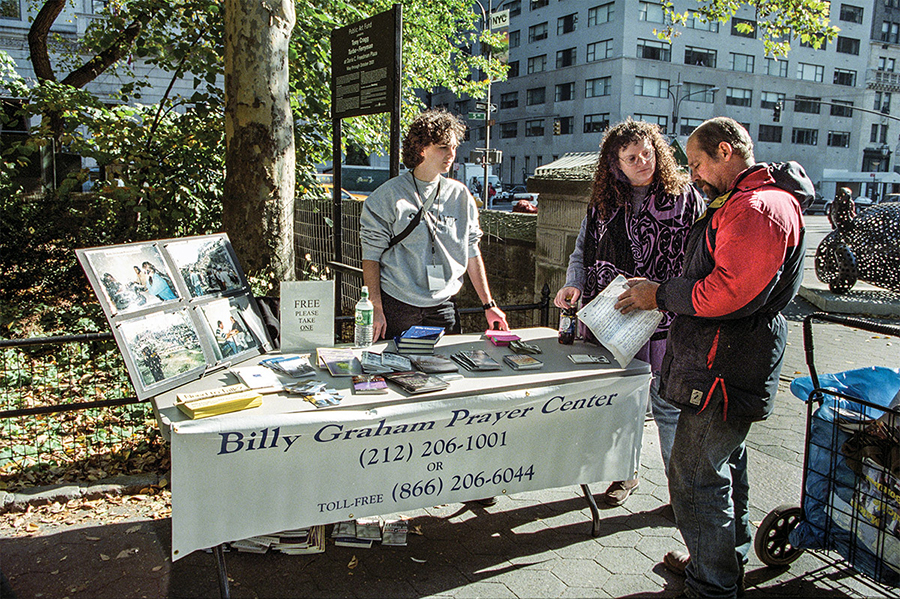On Sept. 11, 2001, my husband and I fled in terror from our 24th-floor apartment after seeing a passenger jet slam into the World Trade Center six blocks from our home. Over the next several hours, we feared for our lives as we sought an escape from the smoke and ash and waves of toxic detritus that blanketed the area when the twin towers collapsed. The destruction left us homeless for several weeks and traumatized for far longer.
In October 2001, I was hired to work as a receptionist in an office that the Billy Graham Evangelistic Association and Samaritan’s Purse had created to offer comfort and counseling to New Yorkers. It was a critical time of recovery for the city and the nation, and I was blessed to be a part of the work that sought to help New York navigate the mental, emotional and spiritual aftereffects of one of the worst terrorist attacks in world history.

After 9/11, as in the aftermath of any tragedy, many people and organizations rushed in to address immediate needs, such as housing for the displaced, funeral and legal services for victims’ families, and even transportation alternatives for stranded commuters and tourists. My husband and I were grateful beneficiaries of such aid.
Shortly after the attacks, BGEA established the Billy Graham New York Prayer Center and coordinated volunteer efforts in various tasks across the city. The organization ultimately worked with about 3,000 volunteers from around the country, handled more than 1,500 calls, distributed more than 15,000 Bibles and more than 200,000 tracts, pamphlets and books in less than a year.
BGEA representatives first visited Ground Zero on Sept. 15 and worked with local clergy to establish a presence and determine needs. They recruited volunteers from around the country to serve food and offer support from a restaurant near Ground Zero. That location provided opportunities to connect with many firefighters, police officers and other rescue workers who were undergoing extreme stress and trauma as they tried to cope with the cleanup and identifying bodies.
Because of 9/11, I became acutely aware that trauma can overwhelm a person’s normal coping mechanisms and even incapacitate a victim for years. In fact, with two decades of hindsight, I now realize I was so paralyzed by my 9/11 experiences that I never took advantage of the wonderful services being offered in my own office! I answered phones and helped with other office tasks, but I didn’t get the help I so desperately needed because I could not find a way to talk about what had happened to me.
But I saw enough to know that the BGEA volunteers were helping other people and that their very presence in New York City was pointing to the Great Healer, Jesus Christ, to help bring about restoration. To accomplish that goal, arrangements were made to rent a space to conduct ministry within a few miles of the attacks. Scope Ministries of Oklahoma City provided trained counselors, and they worked with many police officers who had come into contact with BGEA at the Ground Zero location. Samaritan’s Purse handled the logistics for the office and sent many clergy from North Carolina to work there.
Local churches spread the word about the prayer center, and advertisements ensured that New Yorkers knew that caring people were there and ready to help. Individuals could schedule counseling sessions or walk in for assistance. Soon, the center was seeing a steady stream of victims who were suffering from PTSD and desperately needing trauma therapy.
BGEA maintained a presence in New York City long after 9/11, working with clergy and lay leadership, Police Officers for Christ, Firefighters for Christ and other parachurch organizations. In conjunction with other ministries, BGEA held seminars for pastors and church leaders across New York City to provide training and support for people who were experiencing post-traumatic stress and to help prevent suicide and marital breakdown.
That work after 9/11, and similar services in the years following, ultimately led to what is now called the Billy Graham Rapid Response Team, which deploys crisis-trained chaplains to communities in the aftermath of natural and man-made tragedies across the United States and internationally. The Rapid Response Team has deployed to scores of disasters in the past two decades, such as hurricanes, tornadoes, earthquakes, fires and mass shootings, and it has a continuing ministry to serve and support law enforcement officers.
The ministry helps victims of trauma navigate their experiences, and it has developed a specialized training program for chaplains to help them address specific trauma-related needs.
As a New Yorker with a front-desk seat, I witnessed the organization’s valuable contribution to people who had been shaken to their core by the 9/11 attacks. As an individual who experienced the attacks up close, I recognize the value of loving efforts to point traumatized people to the hope of recovery that is in Christ.
On the 20th anniversary of this disaster, while we vow never to forget, let us also thank God that He works through His followers to provide comfort and restore hearts and minds by bringing the Gospel to broken lives. ©2021 Christina Stanton
Christina Stanton is an award-winning author and a licensed NYC tour guide who specializes in 9/11 history. She and her husband are founders of Loving All Nations, a nonprofit organization that helps the world’s poor. For more information, visit ChristinaRayStanton.com.
Above: Rescue workers search for bodies near an American flag at Ground Zero, Sept. 13, 2001.
Photo: Zuma Press, Inc.
